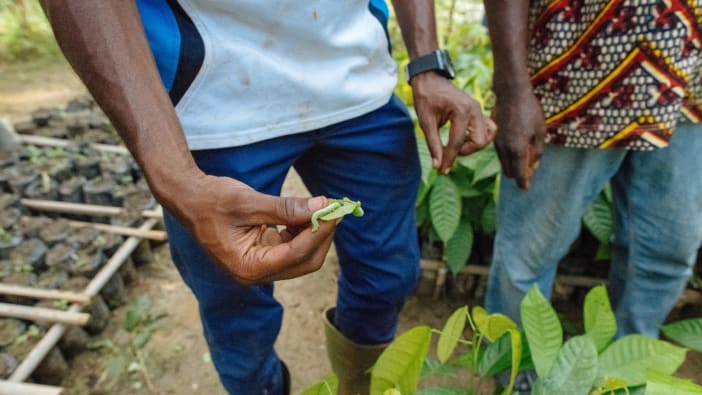Imagine you work as an agricultural extension agent and have to make decisions about pesticides. Pesticide companies may encourage you to use their products. Farmers will ask for advice. Government booklets may recommend a certain treatment.
In many countries, laws to do with pesticides are very weak. Very poisonous pesticides may be brought in the local store. There may be no regulations about storing and applying them. You may find that it is very difficult to learn much about the different chemicals available. For the farmers, it may be almost impossible. So the responsibility lies with you, the extension agent, to provide good, safe advice.
Remember – most pesticides are poisonous: some are very poisonous!
Pesticides may be dangerous because:
- the chemical itself is poisonous
- the chemical is not used properly (when stored, mixed or applied)
A poisonous pesticide, if used properly and carefully, may do no harm. But even a slightly poisonous pesticide, if used carelessly without following the instructions, may do great harm. A very poisonous pesticide used carelessly may do great harm both to people and wildlife. Pesticides may kill if not used carefully!
WHAT SHOULD YOU DO BEFORE USING PESTICIDES?
1. Examine the need
What is the problem the farmer faces?
2. Examine the alternatives
What different ways are there for dealing with the problem?
Consider non-chemical methods like crop rotation, using resistant varieties, hand picking or weeding and good cultivation.
Consider local, traditional methods. But remember that traditional chemicals may also be very poisonous.
Finally, Consider which commercial pesticides would control the problem.
3. Examine the dangers.
Think of the effect each method would have on people, livestock and wildlife. How poisonous are the pesticides or traditional methods which you are thinking of using? Ask for information from the Ministry of Agriculture and pesticide companies. Read the labels carefully. If it’s hard to find this information, complain to the pesticide companies about poor labelling and write to your M.P. about safety regulations!
4. Examine the way in which chemicals will be used.
- Will the chemical be used as a liquid, or as granules? (Granules are usually safer.) Is proper equipment (e.g. a backpack sprayer) available, or will farmers try applying the chemical with poor equipment?
- How much training will the farmers have in using the chemicals safely?
- Do the farmers understand the dangers involved?
- Is protective clothing (gloves, boots, overalls, facemasks) available and will it be used?
- Will the chemicals be stored safely?
- Are the first aid and emergency facilities available, should anything go wrong?
5. Now make your decision.
If you are not sure about some of the answers always assume the worst!
Never recommend a chemical which would be too dangerous in the way it is normally used in your area.
Always choose the least dangerous chemical applied in the safest way, even if this may be the most expensive.
A PRACTICAL CONCLUSION
My own experience in extension work is that:
- Pressure to use dangerous pesticides is very strong.
- Good equipment, protective clothing and storage facilities are rarely available or used.
- Labels on pesticide containers are usually very poor.
If this is the case, then commercial pesticides should probably not be used at all. Always try to encourage farmers to use non-chemical and traditional methods, whenever possible. Give proper training in handling and using pesticides. Make other groups aware of the dangers of pesticides.
Only recommend the less poisonous pesticides such as: cypermethrin (Ambush), fenvalerate (Sumicidin) and pirimiphos-methyl (Actellic).
For small-holder farmers, without access to good equipment and protective clothing, do not recommend pesticides such as aldrin, dieldrin, DDT, HCH (Lindand), dichlorvos (Devevap) and phosphamidon (Dimecron). These are too poisonous and dangerous.
Mike Carter worked in Kenya for four years with TearFund. If you need more information about particular chemicals write to: Mike Carter, TCORD, Bishop Burton, Beverly HU17 8QG, UK.








